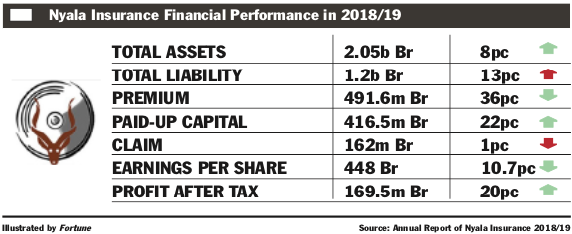
Fortune News | May 31,2025
Nov 5 , 2022
By Halima Abate (MD)
Health insurance - also referred to as medical insurance - is developed to finance a portion of a policyholder's medical costs and benefits, including routine preventive services. No one wants to entertain a risk. Neither people nor companies put their health and profits at stake.
Insurance is a trade between possible future scenarios against unexpected financial losses. It distributes the burden of finance. Insurance is risk management. This applies to health insurance as well.
People without health insurance waive their chances of getting care, while those with insurance are guaranteed. However, having health insurance does not guarantee getting the service. Nonfinancial issues such as lack of healthcare providers, limited access to transportation, illiteracy, and cultural differences are barriers to getting adequate healthcare services.
Nonetheless, a plan to get health insurance is as paramount as risk mitigation.
Planning to use limited budget results in shortcomings as the cost of health services has skyrocketed. Covering treatment costs has transcended from arduous to overwhelming. Getting insurance care prevents people from going bankrupt as a result of medical bills.
When a health service is covered through third-party insurance, the benefits package within a risk-pooling group remains the same, ensuring the quality of services. This results in getting the appropriate treatment and better outcomes. The increasing value for patients is achieving the best results in a risk-sharing and cross-subsidisation manner.
Patients prefer shifting from a supply-driven healthcare system to a patient-centred organised approach. The focus needs to change from the volume and profitability of provided services, such as visits to the physician, hospitalisations, tests and procedures, to the treatment outcomes. Although they may differ in some exclusion policies from public insurance, stakeholders must understand private insurance's role from its macro perspective while using the services.
The controversy over private health insurance is its potential impact on healthcare utilisation.
One end encourages as they ease the financial burden and allow social healthcare systems through organised markets. The other end argues that they contribute to the rapid increase in health expenditures and fragmentation of the system, aggravating social inequity by increasing the gap between opposite ends of the socioeconomic spectrum. If individuals with private health insurance increase their utilisation, the result would be inequitable service.
However, rising costs, global inflation, and the evident need for adequate healthcare make health insurance policies mandatory. The pressure that sudden and critical illnesses put on a family's finance is indisputable, leaving people to turn to their savings, which are rarely sufficient to cover healthcare expenses. Savings cannot serve as a durable way to address healthcare demands.
A pre-payment plan should be available in a country where the practice of saving to reduce the financial burden is not developed.
The value of expenditures lies in buying better health for the population. The concept is broader, including longevity and quality of life, reduced morbidity and mortality rates, relief of pain and suffering, and enhanced ability to function independently. Whether public or private, health insurance is the better way to protect citizens from spending heavily on medical bills. Implementing the policy can cover the nation and enhance productivity, as coverage is critical in making healthcare accessible.
The controversy over private health insurance is its potential impact on healthcare utilisation.
PUBLISHED ON
Nov 05,2022 [ VOL
23 , NO
1175]


Fortune News | May 31,2025

Radar | Jul 02,2022

Radar | Nov 12,2022

Radar | Mar 04,2023

Featured | Nov 16,2024

Fortune News | Feb 22,2020

My Opinion | Apr 20,2024

Radar | Apr 06,2019

Fineline | Apr 12,2020

Fortune News | Dec 21,2019

My Opinion | 131819 Views | Aug 14,2021

My Opinion | 128203 Views | Aug 21,2021

My Opinion | 126147 Views | Sep 10,2021

My Opinion | 123767 Views | Aug 07,2021

Dec 22 , 2024 . By TIZITA SHEWAFERAW
Charged with transforming colossal state-owned enterprises into modern and competitiv...

Aug 18 , 2024 . By AKSAH ITALO
Although predictable Yonas Zerihun's job in the ride-hailing service is not immune to...

Jul 28 , 2024 . By TIZITA SHEWAFERAW
Unhabitual, perhaps too many, Samuel Gebreyohannes, 38, used to occasionally enjoy a couple of beers at breakfast. However, he recently swit...

Jul 13 , 2024 . By AKSAH ITALO
Investors who rely on tractors, trucks, and field vehicles for commuting, transporting commodities, and f...

Jul 5 , 2025
Six years ago, Ethiopia was the darling of international liberal commentators. A year...

Jun 28 , 2025
Meseret Damtie, the assertive auditor general, has never been shy about naming names...

Jun 21 , 2025
A well-worn adage says, “Budget is not destiny, but it is direction.” Examining t...

Jun 14 , 2025
Yet again, the Horn of Africa is bracing for trouble. A region already frayed by wars...

Jul 6 , 2025 . By BEZAWIT HULUAGER
The federal legislature gave Prime Minister Abiy Ahmed (PhD) what he wanted: a 1.9 tr...

Jul 6 , 2025 . By YITBAREK GETACHEW
In a city rising skyward at breakneck speed, a reckoning has arrived. Authorities in...

Jul 6 , 2025 . By NAHOM AYELE
A landmark directive from the Ministry of Finance signals a paradigm shift in the cou...

Jul 6 , 2025 . By NAHOM AYELE
Awash Bank has announced plans to establish a dedicated investment banking subsidiary...